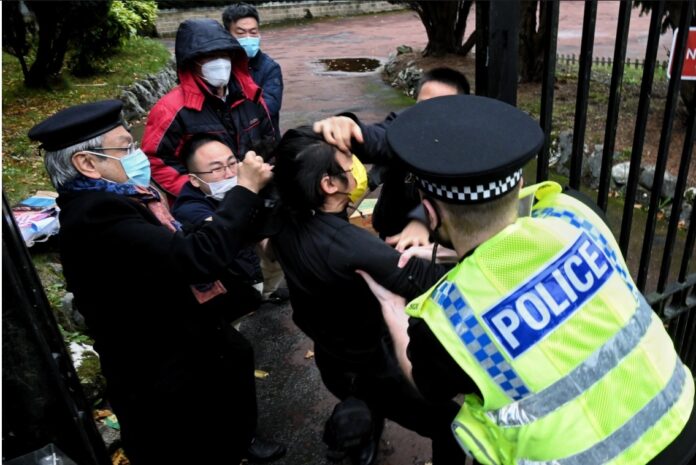By Beh Lih Yi
When Hong Kong journalist Matthew Leung covered a small protest in the northern English city of Manchester last October, little did he know it would become one of the biggest stories in his career—and unleash a diplomatic storm between China and Britain.
His photographs, showing a group of men beating a Hong Kong pro-democracy protester and pulling him into the Chinese consulate grounds in Manchester at the protest, were widely published and eventually led to Beijing removing six diplomats.
They include Consul-General Zheng Xiyuan, who was identified in the photos. He initially denied assaulting the protester but said later he had been trying to protect his colleagues.
“It was not something I had expected,” said Leung, who left Hong Kong for England in early 2022 following a crackdown on press freedom in the city.
He is among a growing number of Hong Kong journalists now reporting from overseas due to the shrinking space for independent reporting back home, with new outlets set up and managed from places like the United Kingdom and Australia.
These include The Chaser, a U.K.-based website founded by Hong Kong journalists last year, where Leung’s photos of the Manchester consulate violence first appeared, before they were widely republished by other media including The Guardian and The Financial Times.
“The response was overwhelming, the calls were nonstop,” Leung told CPJ in a video interview from his home in Manchester.
“It is up to overseas Hong Kong journalists to follow what’s happening to the Hong Kong diaspora closely, we couldn’t expect international journalists to do the same,” he added.
NEW OUTLETS
Once a bastion of press freedom in Asia, Hong Kong’s vibrant media landscape has suffered an unprecedented decline since June 2020 when Beijing imposed the national security law, which has been used to stifle free speech and silence dissent.
The arrests of journalists and closure of prominent news outlets triggered “widespread panic” and an all-time low for press freedom, according to the Hong Kong Journalists Association, which has assessed conditions for journalists in an annual index since 2013.
Among those who are on trial is Jimmy Lai, founder of the pro-democracy newspaper Apple Daily and winner of CPJ’s 2021 Gwen Ifill Press Freedom Award, who faces life imprisonment under the national security law. He has been in prison since December 2020, one of eight Hong Kong journalists on CPJ’s December 1, 2022, prison census.
Separately, former Stand News chief editors Chung Pui-kuen and Patrick Lam are on trial and could be jailed if convicted of breaking a British colonial-era sedition law. The news outlet shutdown in December 2021 after it was raided by some 200 national security police.
But many Hong Kong journalists who have left the city following the clampdown have banded together to continue their reporting from abroad.
One example includes Green Bean Media, set up by a group of former Hong Kong journalists now living in the U.K. The Chinese-language site produces a weekly news analysis program, commentaries, as well as coverage focusing on life among the Hong Kong diaspora in Britain.
Others include Commons, with coverage ranging from Hong Kong’s judicial independence to the government’s approach to tackling the COVID-19 pandemic, and The Points, the latest website run by Hong Kong journalists abroad, which started in January. Both outlets have remote staff on different continents.
“What it shows is that there will be still be a free Hong Kong media [but] unfortunately it won’t be in Hong Kong,” said Steve Vines, director of the Association of Overseas Hong Kong Media Professionals and a journalist who spent over three decades in Hong Kong until he left in mid-2021.
FUNDING NEED
The association launched as a professional membership body in October last year to help the growing number of overseas Hong Kong journalists find opportunities and promote their work, as well as defend press freedom in Hong Kong. The U.K.-registered group has ex-Hong Kong journalists now based in Asia, Australia, and North America on its committee.
“People are determined to keep alive the idea and the tradition of having a free Hong Kong media,” added Vines, who hosted the English-language current affairs TV program The Pulse on Hong Kong’s public broadcaster RTHK until the show was axed in July 2021.
Like other media run by exiled journalists, the new overseas Hong Kong news outlets will need to ensure their long-term financial sustainability to survive.
The majority of the new outlets remain free to read, although some like Green Bean Media and The Chaser have introduced monthly fees for supporters ranging from 6.50 to 34.50 euros (US$7-37).
“We don’t have the financial sustainability yet to recruit full-timers to work,” said Gloria Chan, co-founder of Green Bean Media, where over 90% of her team are freelancers.
Green Bean Media has gained about 2,000 members since launching last July, but Chan said she has been struggling to find funding to expand the website.
“We need to work it out and get the funding as soon as possible,” Chan told CPJ by phone. “It’s difficult to make sure the money [has no strings attached] when we need to have a completely independent source of income.”
CHINESE INFLUENCE
Ensuring Hong Kong journalists can continue to report from overseas helps diversify the media in their host countries, but also adds a critical perspective at a time when Chinese influence is expanding in industries ranging from technology to energy.
Authorities in Germany, Canada, and Japan are among those investigating a 2022 report by Madrid-based campaign group Safeguard Defenders alleging Beijing had established a covert police presence in several countries to monitor Chinese citizens living abroad. Chinese officials have denied the claims.
“Hong Kong reporters, or people with a Hong Kong media background, are helping other organizations to report on China’s infiltration of, for example, universities or key strategic industries in Britain,” said Vines.
But journalists are also keen to bring attention to the territory they have left behind.
“Please keep your eyes on Hong Kong, don’t walk away,” said Nina Loh, a former producer at RTHK who moved to Australia in mid-2021. She has since worked on stories about the Tiananmen crackdown commemorative vigil and lives of Hong Kong immigrants in Australia for the Australian broadcaster SBS.
“It’s normal when people shift their attention to other news after a while but, please, don’t give up on Hong Kong,” she added.
Leung, who photographed the consulate violence, shared the same sentiment.
Besides freelancing for The Chaser after he arrived in Manchester, he worked temporarily as traffic warden and environmental enforcement officer for the local city council, until he was recently offered a contract job with an international broadcaster,
“Of course I would like to return to Hong Kong,” Leung said. “Leaving has not taken away my sense of responsibility. Hong Kong is home forever.”







